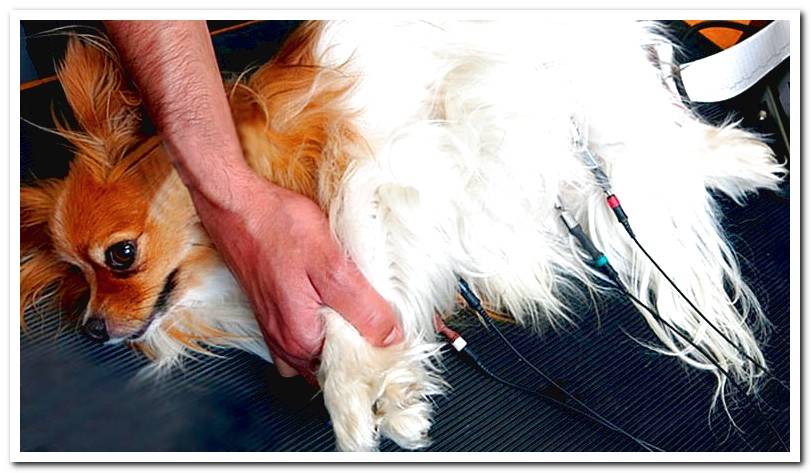
As with humans, dogs can also have heart problems, especially when they reach old age. In fact, heart failure is a very common pathology in these pets and early detention is essential.
The causes and symptoms of heart disease in dogs are varied. If you want to know all the details about how to detect a possible heart disease in time to help your friend live better, keep reading this article and find out.
- You may also like: How to resuscitate a dog
Index of contents
- 1 What is heart failure?
- 1.1 Risk factor’s
- 2 Symptoms of heart disease in dogs
- 2.1 Arrhythmias
- 2.2 Weakness, excessive tiredness and even denial of exercise
- 2.3 Frequent or chronic cough
- 2.4 High heart rate and blood pressure
- 2.5 Breathing difficulties
- 2.6 Greyish or bluish discoloration of the gums and tongue
- 2.7 Weight loss and / or appetite
- 2.8 Swelling of the abdomen
- 2.9 Fainting
- 2.10 Vomiting
- 2.11 Other symptoms associated with heart failure
- 3 Cardiovascular diseases in dogs
- 3.1 Canine filariasis or heartworm disease
- 3.2 Pericarditis
- 3.3 Cardiomyopathy or dilated cardiomyopathy
- 3.4 Endocarditis
- 3.5 Valvular endocardiosis
- 4 How to prevent heart disease?
What is heart failure?
Heart failure refers to the impossibility of an organ, in this case the heart, to fulfill the proper functions that allow the normal development of the organism. Thus, a heart with heart failure is unable to pump the necessary blood throughout the body.
There are different heart diseases that dogs can suffer, framed according to whether they are congenital or acquired with age. The passage of time usually worsens the cardiac situation, causing greater complications that put the dog’s life at risk.
Risk factor’s
Dogs that meet one or some of the characteristics described below are more likely to have heart disease:
- Dogs with a genetic history of heart problems.
- Some breeds, such as: Mastiff, Boxer, Doberman, Cocker Spaniel, Bullterier, Dalmatian, Great Dane, Saint Bernard, and Giant Schnauzer.
- Elderly dogs. If your dog has been more than 7 years old, it is very likely that he has heart problems. In general, all elderly dogs have some form of heart disease. Likewise, larger dogs, as they age at a faster rate, have a greater possibility of suffering these pathologies earlier.
- Small dogs. Mini-sized dogs are also not spared, as they are more prone to heart valve degeneration and endocardiosis.

Symptoms of heart disease in dogs
It is important to recognize and consult the vet at the time we observe that our puppy has any of the symptoms mentioned below. In most cases, the earlier a pathology is diagnosed, the better the prognosis.
Arrhythmias
One of the main symptoms is arrhythmias. An arrhythmic dog has irregular heartbeats, which can be caused by many factors. The evaluation of a specialist is vital to discover the state of the organ.
Weakness, excessive tiredness and even denial of exercise
This symptom is especially visible after making physical efforts or simply after your daily walks. A healthy dog used to a routine you should not have this symptom. If you appreciate your fatigued dog after his routine, you better pay a visit to the vet.
Frequent or chronic cough
If your dog coughs frequently and does it especially at night or after a period of rest, consult the vet, it can be a heart cough.
- Other pathologies related to cough in dogs
High heart rate and blood pressure
In order to detect these symptoms it is important that we carry out regular veterinary checks on our furry friend.
Breathing difficulties
This is presented as one of the most common and visible symptoms. A dog with cardiovascular problems will have respiratory problems, such as shortness of breath, gasping and frequent snoring and rapid breathing.
Greyish or bluish discoloration of the gums and tongue
These parts of the mouth prevent us from many problems that the dog may be suffering, such as poisoning, anemia and, in this case, heart disease.
Weight loss and / or appetite
If our dog maintains his usual diet and is not conditioned by other factors such as the increase in temperature or moments of stress, weight loss and / or appetite is a clear sign of illness that should alarm us.
Swelling of the abdomen
Another sign that we can see is swelling in the area of our dog’s belly, as a result of the accumulation of blood in the area.
Fainting
By not being able to pump blood well to all parts of the body, the blood supply is unable to spread effectively through all parts of the body, such as the brain. This causes, in addition to weakness, habitual fainting.
Vomiting
Although this symptom is very common in other diseases, a dog that regurgitates bile regularly may have a heart problem.
Other symptoms associated with heart failure
- Heart murmurs
- Slow heart rate
- Collapse
- Weight gain
- Heat stroke
- Apathy
- Lethargy
- Accused nervousness especially at night
- Humor changes
Any of these sudden sym
ptoms should serve to motivate us to visit the vet. However, we should not be alarmed ahead of time because may also be due to signs of aging or other ailments.

Cardiovascular diseases in dogs
Heart attacks, infections or cardiac tumors are very rare. However, there are some other very common heart conditions among the dogs.
Canine filariasis or heartworm disease
Filariasis or heartworm disease is a very serious pathology caused by the bite of a mosquito. When bitten, worm larvae enter the dog’s body and reproduce in the dog’s heart and lungs.
- Complete information on filariasis in dogs
Pericarditis
Pericarditis is the name given to inflammation of the pericardium. With this disease, this membrane stores more serum than normal, causing pressure, swelling, and inflammation of the heart.
Cardiomyopathy or dilated cardiomyopathy
When a dog is diagnosed with dilated cardiomyopathy, the walls of the heart muscle are unable to contract strongly. This causes a build-up of pressure and blood volume and subsequent muscle dilation.
- Symptoms of dilated cardiomipathy in dogs
Endocarditis
The valves are affected in this disease. After becoming infected by a microorganism, the bacteria create vegetations within the blood ducts of the dog’s body.
Valvular endocardiosis
This disease acquired with age causes the progressive deterioration of the heart valves.
How to prevent heart disease?
Next, we offer you some prevention tips against heart problems. Although sometimes, as in congenital heart defects, prevention is useless, these tips will also help you to take care of your furry if he already has a diagnosed cardiovascular problem.
- Being overweight increases the risk of heart problems, follows a balanced and quality diet, especially in older dogs
- Regular and moderate physical activity, about 30 minutes each walk
- Avoid the goodies
- Wear a harness on walks and avoid collars
In addition to following the advice indicated, it is essential to visit the vet at the time in which we observe symptoms of heart disease. The professional will perform the relevant tests, such as an electrocardiogram, and will give you the most appropriate treatment.
If it turns out that your friend has a heart condition, the treatment to follow will probably be for life. In addition, regular reviews should be done to monitor the progress of the disease.
